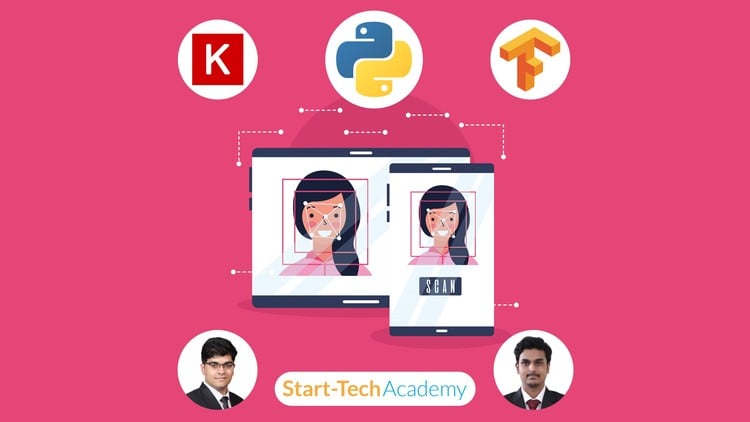
Python for Computer Vision & Image Recognition – Deep Learning Convolutional Neural Network (CNN) – Keras & TensorFlow 2
⏱️ Length: 7.8 total hours
⭐ 4.54/5 rating
👥 130,377 students
🔄 September 2025 update
Add-On Information:
Note➛ Make sure your 𝐔𝐝𝐞𝐦𝐲 cart has only this course you're going to enroll it now, Remove all other courses from the 𝐔𝐝𝐞𝐦𝐲 cart before Enrolling!
-
Course Overview
- Embark on a practical, project-driven journey into Convolutional Neural Networks (CNNs) for Computer Vision using Python. Understand how deep learning revolutionizes image recognition, from core concepts to real-world deployment.
- Explore methods to architect, train, and optimize deep learning models specifically designed for interpreting visual information, positioning you at the forefront of AI innovation.
- Benefit from a curriculum meticulously updated for September 2025, ensuring you learn the latest techniques and best practices in deep learning frameworks.
-
Requirements / Prerequisites
- A solid working knowledge of Python programming fundamentals (syntax, data structures, functions) is essential to follow practical coding exercises.
- Basic familiarity with machine learning concepts like supervised learning and classification will provide helpful context.
- Access to a computer with internet and a Python environment (e.g., Jupyter, Google Colab) is required.
- No prior experience with deep learning, neural networks, or advanced mathematics beyond foundational algebra is necessary.
-
Skills Covered / Tools Used
- Master essential image preprocessing techniques, including resizing, normalization, and advanced data augmentation, crucial for robust CNN model training.
- Grasp the mechanics of CNN architectures: understanding convolutional layers, pooling, batch normalization, and various activation functions like ReLU and Softmax.
- Implement powerful transfer learning methods, leveraging pre-trained models to accelerate training and achieve high accuracy on new datasets.
- Develop proficiency in Keras API for rapid prototyping and building complex neural networks with concise, readable code.
- Gain expertise in TensorFlow 2 for more intricate model customization, designing bespoke training loops, and deploying deep learning solutions.
- Utilize Python’s scientific stack, including NumPy for numerical operations and Matplotlib for insightful data and model performance visualizations.
-
Benefits / Outcomes
- You will confidently design, implement, and deploy bespoke Convolutional Neural Network solutions for various image recognition and computer vision tasks.
- Cultivate a strong project portfolio by developing practical, end-to-end computer vision projects, making you highly competitive in the AI job market.
- Acquire a comprehensive understanding of deep learning theory and practical skills, enabling you to interpret model behaviors and innovate within AI.
- Achieve expert-level proficiency in Keras and TensorFlow 2, industry-standard deep learning frameworks, for a successful career in AI/ML.
- Unlock career opportunities in cutting-edge fields like autonomous vehicles, medical imaging analysis, and advanced robotics, where computer vision expertise is paramount.
-
PROS
- Highly Current Curriculum: Updated for September 2025, ensuring the latest techniques in TensorFlow 2 and Keras for computer vision.
- Exceptional Learner Validation: A strong 4.54/5 rating from over 130,000 students attests to its quality, clarity, and effectiveness.
- Hands-On & Project-Centric: Emphasizes practical application, with tangible projects that solidify understanding and build a professional portfolio.
- Accessible for Beginners: Structured to guide learners from foundational Python skills through to advanced CNN implementations seamlessly.
- Industry-Relevant Tools: Provides mastery of Keras and TensorFlow 2, highly sought-after skills directly applicable in AI/ML roles.
-
CONS
- While providing a solid foundation, learners seeking highly specialized research-level insights or extremely advanced, niche computer vision algorithms might require supplementary academic resources beyond this course’s scope.
Learning Tracks: English,Development,Data Science
Found It Free? Share It Fast!